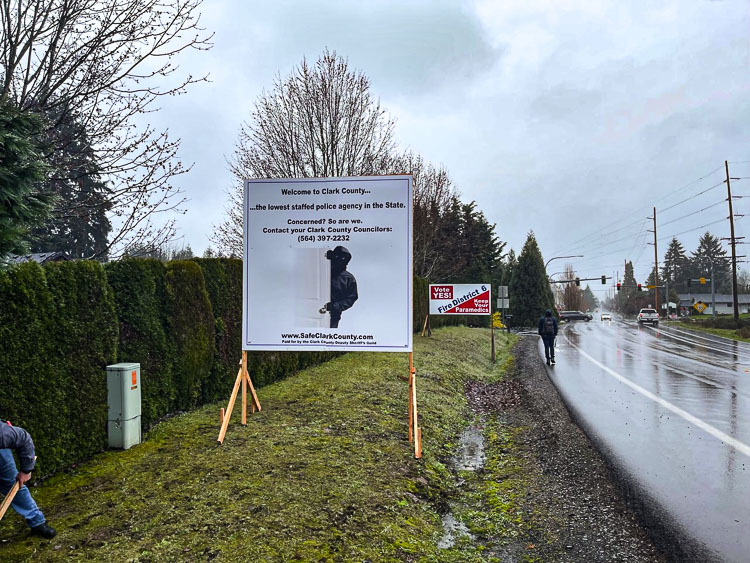Tension remains over lack of a solution to fill the 48 current vacancies
Representatives from the Clark County Deputy Sheriff’s Guild met with County Manager Kathleen Otto and the county’s representative from the Human Resources Department last week to discuss the staffing crisis at the Clark County Sheriff’s Office (CCSO).
On March 14, Sheriff Chuck Atkins issued a statement announcing service cuts by the CCSO due to staff shortages. Beginning March 31, Clark County patrol deputies will no longer respond to calls for several different types of service. Sheriff Atkins urged members of the Clark County Council to take immediate action on suggested staffing solutions.
The next day, March 15, the Deputy Sheriff’s Guild issued a statement providing additional details of the severity of the staffing crisis. Sgt. Brian Kessel, president of the Deputy Sheriff’s Guild, told Clark County Today there are currently 48 total vacancies in CCSO staffing: 14 of those vacancies are in the support branch; there are 20 vacancies in the jail staff; and 14 vacancies in enforcement.
There are a total of four guilds that represent CCSO staff and employees, according to the March 15 statement by the Deputy Sheriff’s Guild. It is not known if representatives from all four guilds were present at last week’s meeting with county officials.
“Our guild and attorney had a meeting with the County Manager and Human Resources Manager last week,’’ Kessel told Clark County Today in an email. “I’m not at liberty to share the details of our conversations with the County, but rest assured that the Guild is actively seeking solutions to our staffing and public safety crisis.’’
Otto did not respond to a request for comment on the meeting, including the question if any more meetings are scheduled.
The fact that the meeting took place didn’t seem to reduce the level of tension that currently exists between the CCSO and the county. On Monday, the Deputy Sheriff’s Guild erected signs around the county that read:
“Welcome to Clark County…
…the lowest staffed police agency in the State…”
The signs also encouraged concerned citizens to contact their representatives on the County Council and directed them to a website the guild created to provide information on the staffing crisis, Safe Clark County.

Since she was appointed County Chair on Feb. 2, Councilor Karen Dill Bowerman has provided weekly video updates to county residents. On Saturday (March 18), Bowerman devoted her entire weekly video to the staffing crisis issue.
“This is covering a sad week in my book, sad because of a division communicated in the media between our Sheriff’s Office and County Council,’’ Bowerman said. “Given the incredibly high level of support that council has for our deputies and the work they do, any division is contrived.
“It was reported that County Council ignored long-term pleas from the Sheriff’s Office for funding recruitment and retention, however, consider these facts:
“Number one: there are 58 funded vacancies currently in the Sheriff’s Office. Many have been vacant for a long time. Note that empty funded positions do not point to a funding problem.
“Number two: the Sheriff’s Office has an expense budget of 68 million this year and that’s up from last year’s expenses of 65 million. Use those dollars as needed, but it wasn’t done apparently.
“Number three: if expense budgets don’t cover what a department envisions they can submit additional funding requests. The sheriff submitted only two this year, unrelated to concerns that the media have been publicizing, and by the way the one for jail medical was fully funded by council and the other is being covered, just differently.
“Number four: The first serious information that I received from the Sheriff’s Office regarding problems and proposals came on March 2. The memo (was) labeled ‘attorney client privilege,’ which means we cannot talk about its contents publicly, not even today. But, I will say that on that same day, March 2, council responded with an executive session regarding bargaining. Remember that county councilors have no authority to bargain. We cannot participate in bargaining terms of employment, which includes pay, so all we do is set financial parameters for those county staff who are authorized to bargain.
“And number five: On March 14, when the sheriff was on vacation, he sent yet another press release announcing this time reduced community service and said his pleas to County Council have gone unanswered. No terms of employment, including pay are bargained and the guilds have a strong voice with county management that is authorized to bargain.
“Our community is divided and I maintain that we can work through this when we try. Let’s focus on facts rather than jumping to emotional conclusions that are just plain wrong or pointing fingers. One thing for sure. We all support the Sheriff’s Department and the invaluable protection they provide. We value their work and appreciate their selfless contributions whether in corrections, road deputies, work or support staff. When the healing of a divided community is called for it can’t be fixed by stricter laws or looser laws or by greater ARPA funding. It starts instead with the healing of the wounds of our relationships and that’s where we must focus now, calmly, factually.
“I am sick on so many levels that this one issue dominated this week from my vantage point. (We) will branch out next week.’’
Kessel provided a response to Bowerman’s comments to Clark County Today.
“The Council Chair points out that empty positions do not point to a funding problem. I would agree,’’ Kessel wrote in an email. “These positions reflect an ineffective compensation package, which causes potential employees and current employees alike to seek employment elsewhere. I would urge Ms. Bowerman to actually look at the facts we have provided to the Council and on our webpage Safe Clark County.
“The funding problem is a factor when we look at the unsafe staffing levels,’’ Kessel added. “In a recent article I read how Ms. Bowerman boasted that the Council has fully funded the Sheriff’s Office. This would lead me to believe the Council feels that being the lowest staffed Law Enforcement agency in the state is acceptable for the citizens of Clark County. This is concerning. The county’s population steadily increases, but the number of deputies fails to increase.
“When the Council Chair spoke of the CCSO budget, she stressed ‘use those dollars as needed.’ My understanding through conversation with CCSO Administrators is that the County made a change 6+ years ago, which takes unused salary dollars and returns them to the general fund. I am not sure if the Chair realizes this, but her statement for our department to use these dollars as needed does not reflect it. Where are these funds going? There are millions in savings.’’
Bowerman reported that the CCSO vacancies were “funded.’’ Last week, she told Clark County Today she believed there were other “administrative’’ factors that explained the inability of the CCSO to attract or recruit candidates to fill those positions.
Information provided by the Deputy Sheriff’s Guild shows an obvious rebuttal to that belief.

According to the Deputy Sheriff’s Guild, the CCSO lags significantly behind neighboring law enforcement agencies in pay and incentives. For example, the average salary (at five years) for CCSO enforcement officers is $80,262 compared to $99,396 at the Vancouver Police Department, $100,452 at the Washington State Patrol and $87,372 at the Ridgefield Police Department. The CCSO and State Patrol don’t offer signing bonuses. The Vancouver Police Department offers signing bonuses of $10,000 and $25,000 and the Ridgefield Police Department offers a signing bonus of $20,000.
As a result, the Deputy Sheriff’s Guild reports that despite the fact that there are currently 48 vacant positions, it has had 0 applicants for corrections officers in the past 55 days and 0 applicants for enforcement officers in 30 days.
In addition, the Deputy Sheriff’s Guild reports that the results of a recent survey of 75 percent of its staff, 27 percent have applied for a job outside of law enforcement or with another law enforcement agency. Another 23 percent indicated plans to retire in the next three years. The top three reasons given for the intended departures are lack of pay, lack of incentive pay, and Washington laws. So, the total potential loss in staffing could be another 50 percent in the near future.
Clark County Today will continue to cover this ongoing story.
Also read:
Deputy Sheriff’s Guild details staffing crisis in Clark County Sheriff’s Office

Clark County Sheriff Chuck Atkins announces service cuts due to staff shortages





